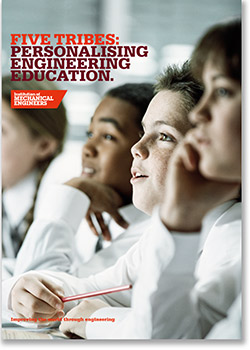Schools must inspire young engineers
15th December 2014 UK: A new report calls for a wholesale change in the way engineering is promoted in UK schools.
UK: A new report calls for a wholesale change in the way engineering is promoted in UK schools.
The report from the Institution of Mechanical Engineers, ‘Five Tribes: Personalising Engineering Education’, is calling on government, teachers, industry and science technology engineering and maths (STEM) organisations to take into account young people’s diverse values and attitudes to try and inspire them about engineering.
According to the report, the number of people employed in engineering and manufacturing in the UK has halved in the last 30 years. At a meagre 10% of the economy, the UK has the smallest proportion of manufacturing of any G8 country.
Yet, at the time of a need to produce and sell more goods to restore the nation’s finances, low levels of interest in engineering among young people, combined with an ageing workforce, sees the UK facing a severe skills crisis.
“In 2010 it was calculated that demand to maintain economic growth meant producing 190,000 engineering graduates and technicians every year till 2020,” says Peter Finegold, head of education and skills at the Institution of Mechanical Engineers. “Last year we produced only 51,000, of our 87,000 target for graduates alone, and time is ticking by.
“Engineering is a hugely creative subject yet our education system too often segregates those it sees as potential engineers from those it deems artists. Yet it is clear that if we are to meet this shortfall, we need to think differently about who our audience is.
“This new report identifies five distinct student types, based on their values, interests and attitudes to STEM subjects, and calls on Government, schools and industry to develop different approaches to inspire them about engineering.
“If we are serious about meeting the UK’s engineering skills shortage we can no longer rely on appealing just to the small proportion of people who are passionate about STEM subjects. Our research shows that young women for example, tend to have a greater affinity to engineering connected to design, medicine, sports and the environment and this should be reflected in the way STEM subjects are presented to them in school.”
 From 1500 interviews the report identifies five clearly defined ‘tribes’ of young people in the UK, aged 11–19:
From 1500 interviews the report identifies five clearly defined ‘tribes’ of young people in the UK, aged 11–19:
• Stem Devotees: enthusiasts who expressed very high levels of enjoyment of STEM subjects, especially mathematics. This group saw STEM-related careers as prestigious, clever and accessible to them.
• Social Artists: young people who tended to enjoy STEM subjects less than other students and who were more likely to be positive about art, English language, drama and dance. Their connection with traditionally ‘creative’ subjects may on the surface make them less likely candidates for a future in STEM, but this group comprises many potential engineers if the engineering community were better able to promote its creative side.
• Enthused Unfocussed: teenagers with wide-ranging interests, including an acknowledged enjoyment and interest in STEM subjects, but who lack confidence that a STEM career is for them.
• Individualists: adolescents who have less interest in engineering as a career and who are more likely to study academic subjects linked to specific vocations, such as law, psychology and business. But as the most entrepreneurial tribe, they would benefit from greater exposure to the opportunities in engineering.
• Less Engaged: pupils who broadly lack confidence in their own abilities and had the lowest affinity of any group with engineering.
The results of the interviews raised important questions about how engineering careers are promoted. For young people, especially young women, it was found that context and self-imagining may matter just as much as earnings and job security when considering their future. For STEM and engineering educationalists, the research suggests that greater audience sensitivity would unleash latent talent in some, while boosting confidence in others.
A copy of the report is available for download here.
Related news:
IoR seeks input on new apprenticeships – November 12, 2014
UK: The Institute of Refrigeration is seeking input from UK industry as it starts the process of developing new apprenticeship standards for air conditioning, refrigeration and heat pump engineers. Read more…
Refrigeration features at Big Bang Science Fair – December 2, 2014
UK: Refrigeration and air conditioning is to presented to engineers of the future at the Big Bang Science Fair in March next year. Read more…







